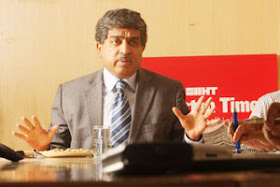Forget the agency, forget Nilekani, it would be a pity to abandon a project that promises to put people on the grid
R. Sukumar
The fate of the government’s ambitious project to provide a unique identification number to 600 million people hangs in balance after a parliamentary committee rejected the bill that enables the initiative, The National Identification Authority of India Bill, 2010.
A file photo of UIDAI chairman Nandan Nilekani.
At this time, the implications of this rejection aren’t particularly clear. It could, as some people are suggesting, mean the end of the road for the project. Or it could, as some others argue, simply mean that the government will have to redraft the bill that provides for the creation of the National Identity Authority of India, which will oversee the exercise to provide unique IDs backed by biometric information.
The project has the support of Prime Minister Manmohan Singh, Finance Minister Pranab Mukherjee (he increased its mandate from the 100 million people it was initially allowed to cover, while the law was being framed, to 200 million), and Congress President Sonia Gandhi (who presided over the launch of the project in a Maharashtra village and also silenced its critics within her National Advisory Council). And Nandan Nilekani, the chairman of the Unique Identification Authority of India (which, once the law is passed, will become the National Identification Authority of India) tried to build broader support for the project by working with several ministries to show them how they could use the number in their programmes.
The project is opposed by Home Minister P Chidambaram, because its scope overlaps significantly with that of the National Population Registry of India, an initiative of the Census department, which functions independently but reports into the home ministry. It is also opposed by privacy activists who argue that there is scope for the data to be misused.
It is opposed by some bureaucrats (such as the Planning Commision’s Sudha Pillai) for reasons related to control. And it is also opposed by thinkers who oppose the things the government plans to achieve with the number -- such as the direct targeting of subsidies and cash transfers.
In general, there are four kinds of people opposed to the project: those who do not want a national numbering system because they are convinced a government with extreme views could use this to facilitate its pogroms; those who want a numbering system but do not want it to be run by the National Identification Authority of India or Nilekani; those who are not comfortable with the technology and safeguards the agency will use to ensure its database isn’t misused; and those who are opposed to the kind of free-market interventions the project, if successfully implemented, will facilitate.
This newspaper’s view is that such a number, irrespective of who issues it, will allow government departments and maybe even private companies to build applications around it that enable them to better serve their customers (and residents are the government’s customers). And while any concerns related to privacy can be addressed by enacting the right laws, it is this writer’s experience that issues related to technology are usually not unsolvable. Forget the agency, forget Nilekani, it would be a pity to abandon a project that promises to put people on the grid (and the underprivileged, unlike the privileged, usually want to be on the grid).
The government’s real challenge is to sell the benefits of its initiative. The identity of the agency or the individual that can run the project and complete it (within a reasonable period of time) is a secondary issue.
